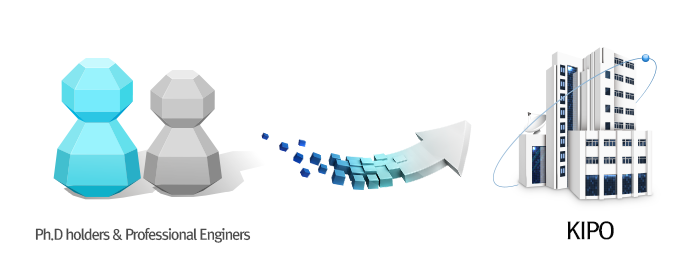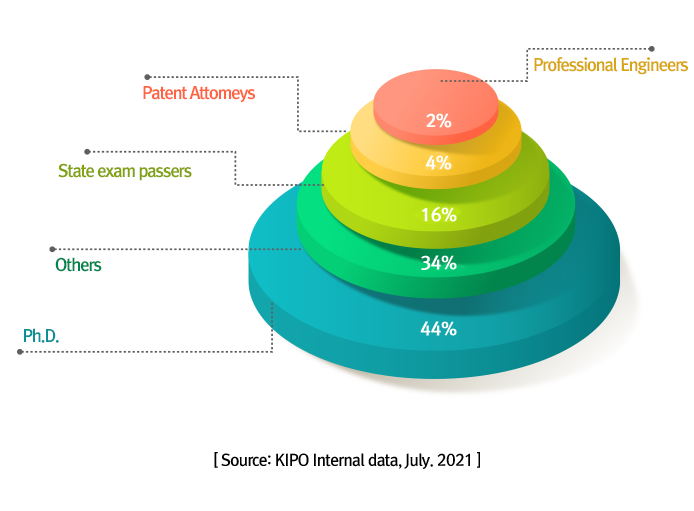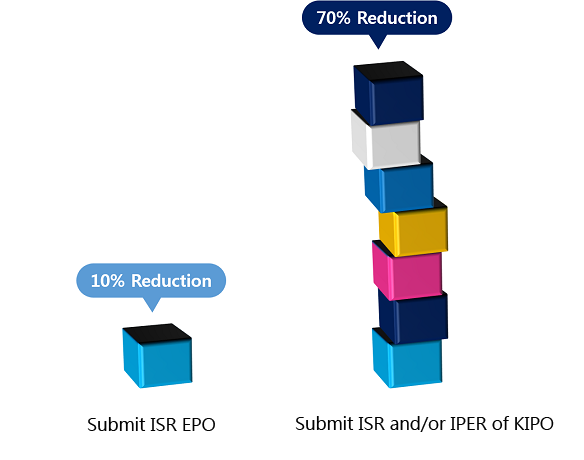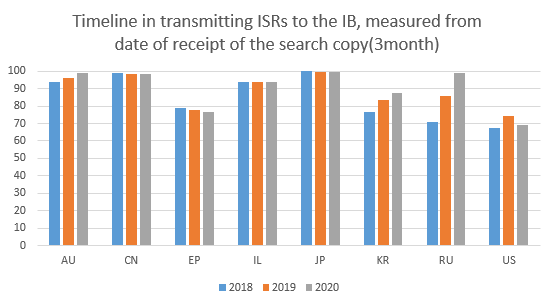The Ministry of Intellectual Property (MOIP), as an IP5 member, has been serving an important role in PCT international applications. For PCT applications in which the U.S. Patent and Trademark Office (USPTO) is the Receiving Office, MOIP has been available as an International Searching Authority (ISA) and International Preliminary Examining Authority (IPEA) since 2006.
MOIP has roughly 900 PCT examiners (MOIP employees who meet requirements such as having a Ph.D., a patent attorney certification, or passing the civil service examination) and about 200 PCT searching personnel (cooperative search company employees who have more than a bachelor’s degree). Expertise in natural sciences and/or engineering is required for all PCT examiners and search staff. While making an effort to hire PCT examiners with the necessary skills, KIPO has provided incumbent examiners with continuous educational opportunities such as specialized lectures and seminars, helping them widen their knowledge and expertise.
PCT examiners and searching personnel, who carry out international searches and preliminary examinations, also possess high levels of language skills that are necessary to comprehend foreign PCT documents and prepare ISR/IPERs. In an effort to help sharpen language skills and prevent potential linguistic obstacles, KIPO has encouraged examiners to attend in-house language programs: English, Japanese, Chinese, Spanish, German, French, and Russian classes are available. Examiners may also take foreign language courses offered by various universities commissioned by MOIP. MOIP has taken searching one step further by equipping its self-constructed search system called the Korean Multi-functional Patent Search System (KOMPASS) with machine translation software. Presently Japanese-Korean, English-Korean and Chinese-Korean translation of foreign patent documents are available.
▶Staff skilled in relevant technology fields
- About 50% with doctorate degrees
▶Excellent reading abilities in foreign languages
- Able to search and analyze Korean, Japanese and Chinese patent documents as well as those of the US and the Europe
▶Built a database for searching Chinese patent documents by the end of 2016

▶ 35 Examination divisions including 2 exclusive divisions for PCT
▶About 950 Patent examiners
▶Continuously employed patent examiners
- To reduce FA pendency and advance quality of exam.
- Ph.D. holders (44%), state exam passers (16%), patent attorney (4%), professional engineers (2%)

[ Source : MOIP Internal data, July.2021 ]
Examination Bureau have also been reorganized into Patent Examination Policy Bureau, Convergence Technology Bureau, Electricity & Communications Bureau, Chemistry & Biotechnology Bureau, Machinery & Metals Bureau in order to efficiently handle convergence technologies and develop examination policy.
To ensure quality international searches, MOIP has strived to secure a competent staff, and has developed an efficient examination infrastructure.
The examination review is mainly conducted by the staff of the Examination Quality Assurance Division, which is directly supervised by the deputy commissioner. It has 12 reviewers for patents, utility models, and the PCT; and 4 reviewers for trademarks and designs.
In 1999, KIPO launched KIPOnet, an internet-based e-filing and work processing platform for the filing, receipt, examination, registration, trial, and publication of applications for patents, utility models, and trademark and design rights. Continual improvements to this system have led to a third generation version called KIPOnet III.
Additionally, we transferred our specialized PCT outsourcing platform to a separate server due to the continual expansion of outsourcing for PCT international searches. This allows us to build an information environment providing dependable service.
The Patent Search System enables us to conduct full text searches of patent gazettes from Korea, Japan, the U.S. and Europe. Linked to the National Digital Science Library managed by the Korea Institute of Science and Technology Information, it also provides access to the academic theses and scientific journals of domestic libraries. Using ‘non-patent literature unified meta searches’ for electronic journals, including IEEE, ScienceDirect and OSA, this system can search multiple Internet sites and show the results on the same screen.
▶KIPOnet system & special search software
▶Different kinds of non-patent document, web database, e-journals
▶STN, CA, KIPO-BLAST, etc.
- Thomson innovation, IEEE, ACM(Computer), Springer, etc.
MOIP now has a database of patent and utility model abstracts in the Korean language, which dates back to 1947 . In addition, we have full text of granted patents and utility models that date back to 1979. Korean patent and utility model applications that date back to 1983 are also a part of the database.
With regards to international patent data, we have collected about 55 different kinds of patents, utility models, and design
data from 22 countries, which date back to 1974. The organizations that provided us with these data include the WIPO, USPTO, EPO, and the JPO.
| Source | Kind of Document | Coverage | Format |
|---|---|---|---|
| Europe | DOCDB 2.0 | 1974~ | Text |
| Espace-A | 1978~1999 | Image | |
| 1975~2004 | SGML | ||
| 2004~ | XML | ||
| Espace-B | 1980~1999 | Image | |
| 1980~2004 | SGML | ||
| 2004~ | XML | ||
| Espace-world | 1978~2002 | Image | |
| Text | |||
| SGML | |||
| WIPO | Pamphlet [Impact Rule87 ] | 2002~ | XML |
| U.S.A | |||
| Granted Patents | 1975~ | Image | |
| 1976~2004 | SGML | ||
| 2005~ | XML | ||
| Patent Applications | 2001~ | Image | |
| 2001~2004 | SGML | ||
| 2005~ | XML | ||
| Taiwan | Bibliographic data / Abstracts [from Patent Applications] | 2000~ | Text |
| United Kingdom | Bibliographic data / Abstracts [from Patent Applications] | 1991~2007 | SGML |
| 2007~ | XML | ||
| China | Patent Applications and Granted Patents [English Adstracts] | 1985~ | Text |
| Canada | Patent Applications / Granted Patents | 1999~2007 | SGML |
| 2007~ | XML | ||
| Australia | Patent Applications / Granted Patents | 1998~ | SGML |
| Germany | Gazettes of Patents & Utility Models | 1991~ | Image |
| France | Gazettes of Patents | 1992~ | Image |
MOIP provides international search services with costs approximately 50% lower than those of other major authorities, except for ROSPATENT, ILPO and JPO. The low-cost and high quality are strong competitiveness, favored by U.S. PCT applicants.
| Competent ISAs for U.S Applicants | Search Fee(USD) | Preliminary examiation Fee |
|---|---|---|
| MOIP(Korea) | 1,036 | (KRW) 450,000 |
| EPO | 2,091 | (EUR) 1,830 |
| USPTO | 2,180 | (USD) 640 |
| JPO(Japan) | 1,476 | (JPY) 58,000(in English) |
| IP Australia | 1,697 | (AUD) 590 |
| ILPO(Israel) | 1,107 | (ILS) 1,535 |
| ROSPATENT(Russia) | 543 | (RUB) 16,000(in English) |
| IPOS(Singapore) | 1,646 | (SGD) 830 |
[ Source: WIPO PCT Fee Tables, as of 1 July 2021 ]
MOIP also provides reduced rates for demand fees for the examination. If you submit ISR and/or IPER from MOIP, you will get a 70% reduction.

The ISA must establish the ISR within three months from its receipt of a copy of the application (the “search copy”), or nine months from the priority date (or, if no priority is claimed, from the international filing date), whichever expires later. An ISR that gets delivered to the PCT applicant in a timely manner is a crucial factor in the PCT process. This allows the PCT applicant ample time to properly prepare for the next stage of the ongoing PCT process.
MOIP always tries to deliver ISRs in the promised time frame and amongst ISAs popular with U.S. applicants(USPTO, EPO, MOIP) MOIP has had the best track record when it comes to publishing ISRs in a timely manner. In 2020, MOIP transmitted 87.5% of ISRs to the IB within three months from the date of receipt of the search copy. By contrast, EPO was 76.4% and USPTO was 68.9% respectively.

* Timeliness is calculated as the time elapsed between the priority date and the date on which the ISA transmits the ISR to the IB (or, if applicable, the date of receipt of the declaration under Article 17(2)(a)). The figure shows timeliness in establishing the ISR, where the applicable time limit for establishing the ISR under Rule 42 is three months from receipt of the search copy.